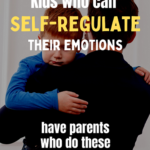Discipline is analogous to a guiding light in a child’s quest to discern right from wrong. In the sphere of parenting, consistency emerges as the lodestar that guarantees this light burns brightly. It is the thread that knits together the fabric of good parenting, keeping small offenses and unwanted habits from growing into more major transgressions. However, the art of constancy is not only about staying steadfast in your views; it requires embracing the difficulties of motherhood with unshakable commitment.
Consistency, in essence, is the cornerstone of teaching essential life skills to your kid. It is the determination to follow through on your statements and deeds, especially when confronted with difficulty. When you say, “It’s time to turn off the television” or “No dessert because you didn’t eat your dinner,” it is vital that you mean every word. This steadfast position implies that actions incur consequences—a key lesson in responsibility.
Inconsistent discipline, on the other hand, leads to confusion. It throws the onus of your child’s crimes firmly on your shoulders, robbing them of the ability to accept responsibility for their actions. Inconsistency offers confusing messages, muddling the boundary between right and wrong.
The need of consistency goes beyond the acts of a single parent. It needs a cohesive front, when both parents coordinate their disciplinary measures. If one parent takes a rigorous posture while the other tends towards leniency, youngsters adeptly notice the differences and may strive to utilize the situation to their advantage. Thus, parents must agree on a unified definition of disciplinary action and commit to enforce it consistently.
This connection becomes even more vital in circumstances when parents are separated or divorced. Although the romantic relationship may have ended, the commitment to co-parenting remains constant. Open and honest talks between both parents, and with the kid, are crucial to create clear limits and consequences. The kid should never bear witness to arguments between parents, ensuring their emotional well-being stays intact.
The route of consistency is not always easy; it frequently demands for unshakable fortitude and resolve. There are days when going home after a tough workweek simply leads to the overwhelming prospect of a difficult evening of parenting. During these times, your youngster may continuously test the boundaries you’ve established, pushing the bounds to identify any area for negotiation in the penalties you’ve specified. Standing strong at these times is a vital component of parenting, one that signals that there is no place for compromise when it comes to taking responsibility for one’s actions.
In this complicated dance of discipline and consistency, parents play the role of both instructors and pupils. While guiding their children toward the road of responsibility, parents often find themselves learning essential lessons along the way. The voyage becomes a collaborative discovery, creating development and understanding within the family.
In conclusion, consistency is the foundation of good parenting, shaping children into responsible persons who understand the repercussions of their actions. It is a resolve to maintain ideals and principles, especially in the face of hardship. Through constancy, parents equip their children to negotiate the challenges of life with clarity and purpose. In this symbiotic connection, both parents and children emerge stronger and more resilient, able to tackle the difficulties that lie ahead.





